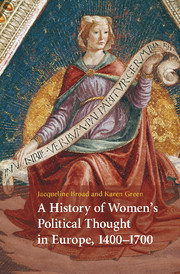Book contents
- Frontmatter
- Contents
- Preface
- Introduction
- 1 Christine de Pizan
- 2 Women of the Italian Renaissance
- 3 From Anne de Beaujeu to Marguerite de Navarre
- 4 Queen Elizabeth I of England
- 5 From the Reformation to Marie le Jars de Gournay
- 6 Women of the English civil war era
- 7 Quaker women
- 8 The Fronde and Madeleine de Scudéry
- 9 Margaret Cavendish, Duchess of Newcastle
- 10 Women of the Glorious Revolution
- 11 Women of late seventeenth-century France
- 12 Mary Astell
- Conclusion
- Bibliography
- Index
11 - Women of late seventeenth-century France
Published online by Cambridge University Press: 02 July 2009
- Frontmatter
- Contents
- Preface
- Introduction
- 1 Christine de Pizan
- 2 Women of the Italian Renaissance
- 3 From Anne de Beaujeu to Marguerite de Navarre
- 4 Queen Elizabeth I of England
- 5 From the Reformation to Marie le Jars de Gournay
- 6 Women of the English civil war era
- 7 Quaker women
- 8 The Fronde and Madeleine de Scudéry
- 9 Margaret Cavendish, Duchess of Newcastle
- 10 Women of the Glorious Revolution
- 11 Women of late seventeenth-century France
- 12 Mary Astell
- Conclusion
- Bibliography
- Index
Summary
In late seventeenth-century Europe, women wrote in numbers never previously encountered. Whereas in England a significant proportion of the women who engaged with political ideas were from the middle class, in France authors of the works that we have access to were from the aristocracy or associated with aristocratic circles. Their works emerged out of the salons and mixed polite society established in the middle of the seventeenth century, and the maxim form was particularly popular. Madeleine de Souvré, Marquise de Sablé (1598–1678), Marguerite Hessein, Madame de la Sablière (1640–93), Françoise d'Aubigné, Madame de Maintenon (1653–1711), and Queen Christina of Sweden (1626–89) all left collections of moral maxims. These works attempt to pithily characterise human vice and virtue. Yet they only rarely have an explicit political bearing and their form is not conducive to the development of a systematic philosophy. Increasingly women also published novels, stories, plays, poetry, and memoirs. Even their letters, though not necessarily intended for publication, were offered to the public, the most famous and abundant example being those of Madame de Sévigné (Marie de Rabutin-Chantal).
Women such as Marie Madeleine Pioche de la Vergne, Comtesse de La Fayette (1634–93), Marie-Catherine Le Jumel de Barneville, Comtesse d'Aulnoy (1650–1705), Marie-Catherine-Hortense Desjardins, Madame de Villedieu (1640–83) and Antoinette du Ligier de la Garde, Madame Deshoulières (1638–94) wrote to entertain and met with considerable critical and financial success.
- Type
- Chapter
- Information
- A History of Women's Political Thought in Europe, 1400–1700 , pp. 247 - 264Publisher: Cambridge University PressPrint publication year: 2009



